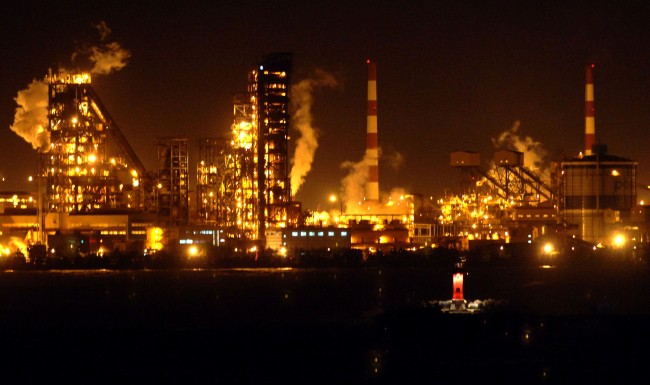The nation’s shipbuilding and steel industries, both of which were in recession last year, are forecast to go through another difficult year in 2015 mainly due to the worsening business environment.
The Federation of Korean Industries, a leading business association in Korea, issued a dim outlook for the shipbuilding industry this year, which suffered from record losses in the second quarter of 2014.
Hyundai Heavy Industries, the world’s largest shipbuilder, reported record operating losses of 1 trillion won ($900 million) in Q2 last year as low-margin ship orders increased and offshore plant projects were delayed amid the prolonged global economic downturn.
The weak performance prompted the top shipbuilder to take structural reform measures during the second half of last year.
 |
A night view of POSCO’s plant in Pohang, North Gyeongsang Province (Bloomberg) |
Despite the firm’s swift response to the market conditions, the falling yen is further hurting the shipbuilder’s competiveness. As a case in point, international market researcher Clarkson Research Service found that Korean shipbuilders were overtaken by Japanese competitors in winning orders during September last year.
“It would take more than a year for the shipbuilding industry to bottom out unless the global economy makes a turnaround,’’ the business association said in a recent report.
The country’s steel industry, which was squeezed by a glut of global steel production, a falling profit margin and rising competition from Chinese steelmakers, would also shrink further this year, industry watchers said.
“Behind the dim outlook this year is the falling demand for steel products in China,’’ said Park Sung-bong, a stock analyst from Hana Daetoo Securities. “The China factor will drop the growth in global steel demand to the 2 percent range.’’
The demand growth rate is lower than the 3.3 percent projected by the World Steel Association.
The continued oversupply in steel products this year, caused by Chinese steelmakers, will also put a drag on steelmakers’ profitability, according to industry watchers.
“It is critical for Korean steel companies to develop a contingency plan in preparation for the worsening business environment,’’ Park said.
To cope with challenges ahead, POSCO, the country’s top steelmaker, will step up its business portfolio reorganization to bolster its fiscal soundness and global competitiveness. Last year, POSCO sold its 72 percent stake in stainless steelmaking affiliate POSCO Specialty Steel to SeAH Group for 1.1 trillion won as part of efforts to improve its balance sheet.
“POSCO is forecast to push for more deals this year as the chairman Kwon Oh-joon wants to scale back the firm’s noncore segments and focus on the core,’’ Park said.
Meanwhile, Hyundai Steel, the nation’s second-largest steelmaker, has expanded by acquiring Dongbu Special Steel. The move was seen to have been part of its efforts to achieve vertical integration among its steelmaking businesses.
By Seo Jee-yeon (
jyseo@heraldcorp.com)





![[Exclusive] Hyundai Mobis eyes closer ties with BYD](http://res.heraldm.com/phpwas/restmb_idxmake.php?idx=644&simg=/content/image/2024/11/25/20241125050044_0.jpg)
![[Herald Review] 'Gangnam B-Side' combines social realism with masterful suspense, performance](http://res.heraldm.com/phpwas/restmb_idxmake.php?idx=644&simg=/content/image/2024/11/25/20241125050072_0.jpg)

